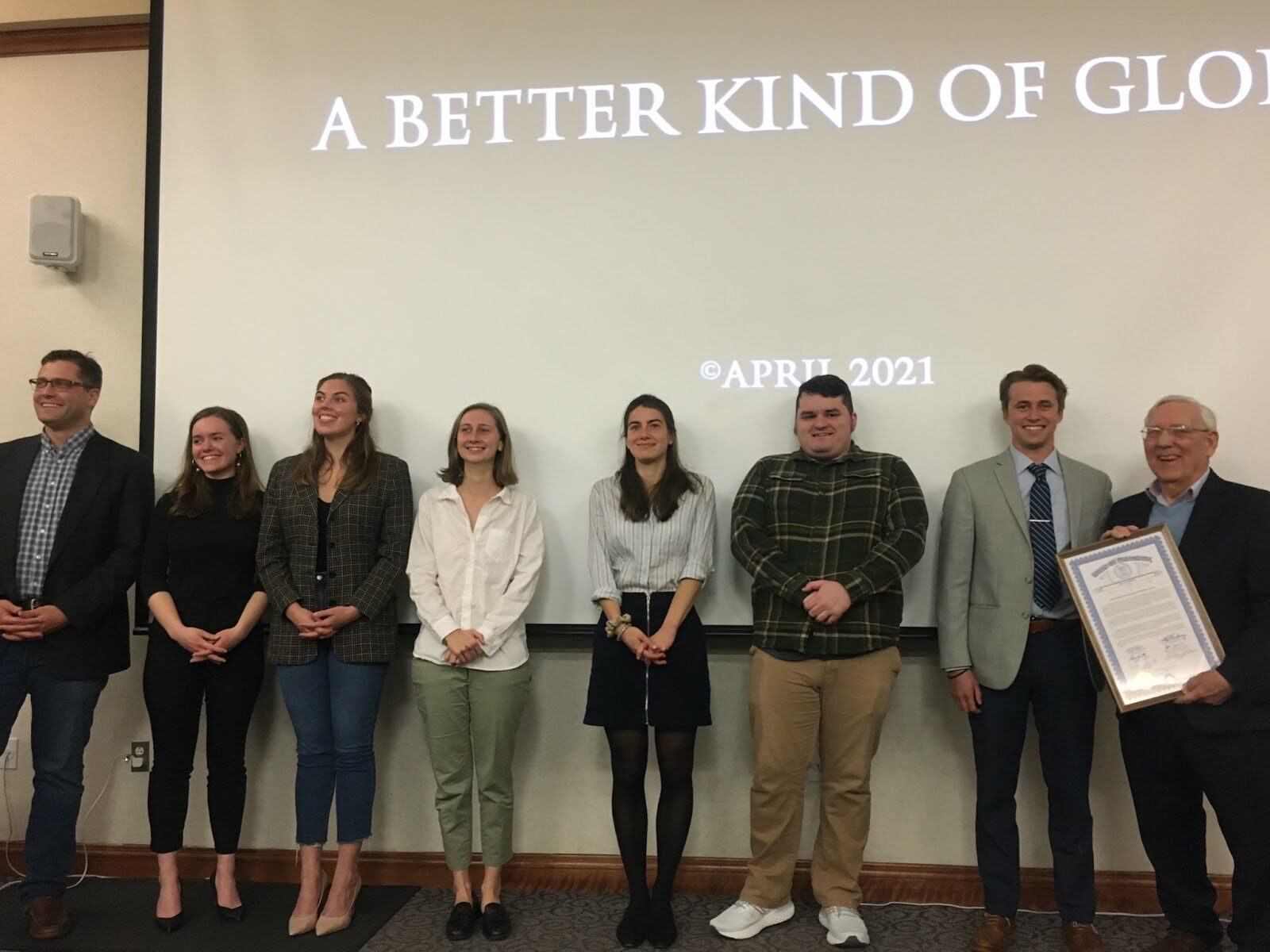
Madeline Peltzer | Collegian
“This is the story of a football team who gave up their success on the field to preserve the dignity of their brothers off the field.”
That’s how the documentary “A Better Kind of Glory” begins, and that’s the story the audience came to hear at the film’s premiere this week. In the basement of Lane Hall on April 19, students, faculty, friends, and members of the community gathered to watch a film by students who took the college’s first-ever video storytelling course.
Their documentary described how the 1955 Hillsdale College football team turned down the opportunity to play in a major bowl game because its organizers refused to let black players participate.
In the 1950s, the Tangerine Bowl — now called the Florida Citrus Bowl — was a prestigious New Year’s Day bowl game, pitting the top two small-college football teams against one another. At the time, however, the bowl was a whites-only game.
Hillsdale’s undefeated team included four black players.
Hillsdale head coach Frank “Muddy” Waters went to Orlando to lobby the organizers for an invitation to the game, one that would allow every member of his team to play, regardless of their skin color. Waters left thinking they had reached an agreement, but when the game’s organizers extended the invitation, they stipulated that Hillsdale would be required to leave behind their black athletes. Waters put the question to a vote among his team. Would they attend without their black teammates or not participate in the game at all?
The decision was easy. If they all couldn’t play, then nobody would play.
The 35-minute film, narrated by Assistant Dean of Men Jeffery Rogers, is the culmination of the newest course in the Dow Journalism Program: Video Storytelling, taught by Emmy-nominated journalist Buddy Moorehouse, which Head of the Dow Journalism Program, John J. Miller has been working to add to the curriculum.
“John told me about this story years ago,” Moorehouse said. “We talked about doing a video storytelling class, and I wanted to do a group project. I knew right away that we had to do something with the Tangerine Bowl story. It’s one of those iconic Hillsdale College stories that people know a little bit about, but they don’t know the full story. When they find out the full thing they’re blown away.”
Moorehouse noted at the viewing how few documentaries have been made about Hillsdale College, a failing his video class aims to remedy.
“One thing we’ve tried to stress in this course is that you don’t need expensive equipment or a crew,” he said. “All you need is a good idea and a phone.”
That, and a lot of teamwork. The documentary was written, filmed, edited, researched, and directed by a group of six students: seniors Elizabeth Bachmann, Emma Cummins, Stefan Kleinhenz, Carmel Kookogey, Regan Meyer, and junior Paul Tinkle.
To tell the story, the team used old and new video footage, photographs, newspaper clippings, and a series of interviews with Hillsdale staff, current football players, relatives of members of the 1955 football team, and even two of the players themselves.
Meyer, who was in charge of writing the storyline, said the process was challenging.
“Writing a script was hard for me because I was putting the script together for a film that wasn’t at all done,” Meyer said. “I think we renumbered the script 10 times because we kept adding and deleting things.”
Andy Kincannon, who was one of the most gifted and versatile athletes of the 1950s and a black player on the team at the time, was interviewed in the film but was unable to attend the viewing.
His teammate, Ron Perian, was featured in the film and attended the documentary’s premiere on Tuesday.
“I didn’t know what to expect,” Perian said. “We didn’t really make that big a deal about it, but it was good to see the effect it had on other people.”
In fact, Perian’s grandson, also named Ron, said he hadn’t even been fully aware of his grandfather’s involvement with the Tangerine Bowl until the day before the documentary’s premiere.
“I’d heard bits and pieces, but he’s a pretty humble guy,” the younger Ron Perian said of his grandfather’s silence on the subject. “He’d rather hear about your day than tell you about his.”
In addition to watching himself on the big screen, Perian received a commemorative tribute from Rep. Andrew Fink, a 2006 graduate of Hillsdale College. The document, which is signed by several state government officials including Gov. Gretchen Whitmer and Lt. Gov. Garlin Gilchrist II, honors the 1955 Hillsdale College football team for its “outstanding athletic achievements and its dedication to the American principles of liberty and justice for all.”
For Kleinhenz, who served as the film’s director, the evening was an “emotional” experience from start to finish.
“I’ve worked on this film for hours and hours and hours,” Kleinhenz said. “But seeing it tonight and knowing that everyone else was seeing it for the first time and watching it through their perspective—it choked me up a little bit.”
Kleinhenz said steeping himself in the documentary made him feel deeply connected to the people involved, as if he’d always known them. In fact, the experience has inspired him to switch his career plans to making documentaries professionally.
“You get so invested and interwoven in these stories and the people in them that you can’t help but feel like they matter,” he said. “To be the one who gets to tell these stories—you don’t feel worthy of it. It’s a beautiful thing.”

